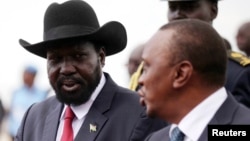JUBA, SOUTH SUDAN —
South Sudan President Salva Kiir said Thursday that he would “never accept” the International Criminal Court. He spoke during a visit from new Kenyan president and ICC indictee Uhuru Kenyatta, who pledged the creation of roads, rail and pipelines to deepen economic ties between Kenya and the new nation.
It was Uhuru Kenyatta’s first visit to South Sudan since becoming Kenya’s president, and he was greeted with open arms by Salva Kiir, who told him “this is your home” and pledged the new nation’s solidarity with the contentious leader and his people.
Kenyatta took office after winning a March election while under indictment from the ICC, which accuses him of inciting some of the ethnic violence that followed the disputed 2007 vote.
But while western nations were slow to congratulate him, other African leaders were quick to support him, regardless of looming charges at the Hague tribunal.
On Thursday, Kiir dismissed the court and South Sudan’s willingness to sign up to it via the Rome Statute, echoing statements by some other African leaders that the court seems to target them.
"We have talked about these problems of the ICC, that the ICC, whatever has been written in Rome, has never been used against any one of their presidents or heads of states. It seems that this thing has been meant for African leaders, that they have to be humiliated,” said Kiir.
He also said the international community has used aid as a carrot to try and get the new nation to sign up to the court.
"In brief, it has been something that we have been straightforward in it, and we never accept it. And they have been coming to us as a condition that we have to sign the Rome Statute so that we get assistance, but we have refused," said Kiir.
Sudan President Omar al-Bashir also has been indicted by the ICC on charges of war crimes and genocide in Sudan's Darfur region, where his government has battled rebels since 2003.
Kiir said that he and other African leaders would discuss the ICC’s role further at the African Union summit this weekend in Ethiopia, as the organization celebrates its 50th birthday.
"So we talked about this, and we are going to talk about this in Addis Ababa, and it is something that you know, we will sit together with our brothers and sisters in Kenya,” he said.
In his remarks, Kenyatta called for the continent to stand together and re-assert its authority over its own matters.
“We have also underscored the importance for us as Africans being able to work together to create a solution for our own problems and issues that we face,” said Kenyatta.
As the continuing pledges of solidarity rolled in, he also promised a deepening of economic ties with South Sudan via road and railway links and an oil pipeline. The pipeline would ease South Sudan's reliance on Sudan to the north to export its vast crude oil wealth.
It was Uhuru Kenyatta’s first visit to South Sudan since becoming Kenya’s president, and he was greeted with open arms by Salva Kiir, who told him “this is your home” and pledged the new nation’s solidarity with the contentious leader and his people.
Kenyatta took office after winning a March election while under indictment from the ICC, which accuses him of inciting some of the ethnic violence that followed the disputed 2007 vote.
But while western nations were slow to congratulate him, other African leaders were quick to support him, regardless of looming charges at the Hague tribunal.
On Thursday, Kiir dismissed the court and South Sudan’s willingness to sign up to it via the Rome Statute, echoing statements by some other African leaders that the court seems to target them.
"We have talked about these problems of the ICC, that the ICC, whatever has been written in Rome, has never been used against any one of their presidents or heads of states. It seems that this thing has been meant for African leaders, that they have to be humiliated,” said Kiir.
He also said the international community has used aid as a carrot to try and get the new nation to sign up to the court.
"In brief, it has been something that we have been straightforward in it, and we never accept it. And they have been coming to us as a condition that we have to sign the Rome Statute so that we get assistance, but we have refused," said Kiir.
Sudan President Omar al-Bashir also has been indicted by the ICC on charges of war crimes and genocide in Sudan's Darfur region, where his government has battled rebels since 2003.
Kiir said that he and other African leaders would discuss the ICC’s role further at the African Union summit this weekend in Ethiopia, as the organization celebrates its 50th birthday.
"So we talked about this, and we are going to talk about this in Addis Ababa, and it is something that you know, we will sit together with our brothers and sisters in Kenya,” he said.
In his remarks, Kenyatta called for the continent to stand together and re-assert its authority over its own matters.
“We have also underscored the importance for us as Africans being able to work together to create a solution for our own problems and issues that we face,” said Kenyatta.
As the continuing pledges of solidarity rolled in, he also promised a deepening of economic ties with South Sudan via road and railway links and an oil pipeline. The pipeline would ease South Sudan's reliance on Sudan to the north to export its vast crude oil wealth.




